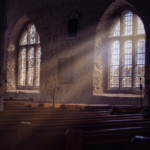A friend recently remarked on the absence of gratitude in contemporary political life. As he sees it, an inordinate disposition to critique and demand has all but destroyed thankfulness for the many benefits of living in the United States. I don’t disagree, even though our society is unjust enough to warrant serious critique.
I’d suggest, however, that ingratitude is not a momentary infection of the body politic, not the result of four years of Trump or economic inequality or any other specific political dissatisfaction. Instead, our culture’s deep ingratitude is the long outworking of the logic of modern thought itself.
Hans Jonas noted that “reason triumphant through science has destroyed the faith in revelation, without, however, replacing revelation in the office of guiding our ultimate choices.” Modern thought creates the “nihilistic situation” in which we find ourselves, and it’s very difficult to be grateful under conditions of nihilism. To whom, for what should we be thankful?
As Jonas puts it, the modern scientific view of nature sees itself as a negation of the biblical view of the world. If the Bible teaches that the world is created by God, for modern science, “by contrast,” the world “has ‘made’ and is continuously making ‘itself.’ . . . The world at every moment is the last word about itself and measured by nothing but itself.” Further, while the Creator declares the world to be “very good,” the world of “modern physics is neither ‘good’ nor ‘bad;’ it has no reference to either attribute, because it is indifferent to that very distinction.” The world of fact, the world as it is, is utterly alien to the world of value, and terms such as good, bad, or value are entirely “human measures” that do not refer to anything in the world itself.
Start your day with Public Discourse
Sign up and get our daily essays sent straight to your inbox.Ingratitude is not a momentary infection of the body politic, not the result of four years of Trump or economic inequality or any other specific political dissatisfaction. Instead, our culture’s deep ingratitude is the long outworking of the logic of modern thought itself.
The world of modern science, claims Jonas, is utterly devoid of goals or purpose, and “man is the sole repository” of value and intentionality.
Man’s Place in a Universe of Force
Given our uniqueness as the repository of value and purpose, it might seem that humans possess some sort of dignity, even a divine-like status. However, as Steven Pinker pointedly reminded us, the idea of dignity is “stupid.” As Jonas insists, the biblical declaration that humans are created in the image of God can hardly be true if there is no Creator, and the remnant hangover of dignity-talk cannot survive “the naturalistic doctrine of evolution as it applies to the human species.” On that view, we are nothing more than meat-robots, to put it indelicately, and everything implies we are ontological trash. Nothing about this reductionism suggests human dignity, but merely “the chance transactions of the evolutionary mechanics, with the survival premium the only selective principle.” Our “being is legitimized by no valid essence.” Or so Jonas interprets the situation.
Moreover, as naturalistic evolution purports to explain our existence, so its analogue, historicism, explains our morality: each distinct and accidental culture “generates and imposes its own values,” and because values are mutable throughout history, there is “no appeal from the stream of fact to a court of truth.” Even more, when we turn from history to the individual, reductionism again cuts “man down to size, . . . stripping him in his own eyes of every vestige of metaphysical dignity.” We are animals ordered to survival, nothing more, in a stark universe, where force governs all.
Force is the key. Hand-in-hand with our metaphysical humbling we discover our “promotion to quasi-God-like privilege and power.” After all, while the universe is devoid of purpose, we are the sole repository of intentionality; of course, intentionality is nothing but power—but such power, responsible to nothing other than the values we generate and impose for ourselves upon ourselves.
If any of this is true, for what and to whom should we feel grateful? To blind Darwinian forces? To our fathers who themselves generated and imposed power dynamics on themselves and others? To self-serving and self-regarding institutions which follow the way of all flesh and seek their own survival as the first and last principle?
No. Each and every prince and power and dominion, every moral code and religion and law, each authority and hero and founder lived out one thing and one thing only: power. Only the feeble and the foolish think otherwise, and politics is not about the common good or the rule of law or piety, but power. Gratitude is a foolish indulgence, at best. Instead of thankfulness, hegemony. Such is the suspicion accompanying the contemporary mind, and the schools which form that mind.
The Revolt against Cosmic Order
Now, it may seem a stretch to go from Francis Bacon’s desire to use science for the “relief of man’s estate” to Antifa on the streets of Portland. On the other hand, a universe of force and a politics of force are not unrelated. As argued in his remarkable (and remarkably titled) book, just recently available in English translation, Dostoevsky Reads Hegel in Siberia and Bursts into Tears, the Hungarian critic László Földényi argues that the mob, in its contemporary manifestation, is a symptom of the revolt against cosmic order itself.
Cosmic order is the background of all our lives and experiences; it is the structure of reality itself, although philosophers and theologians articulate it in various ways. Parmenides called it “being,” Heraclitus went with “logos,” Plato gives the image of the sun, others went with “arche,” “providence,” “light,” “the Word,” “eternal law,” “natural law,” or “luminosity.” Whatever the term, cosmic order is the condition of possibility of everything else—that which makes it possible for us to live and move and have our being, to think, and to act. Földényi rightly insists that cosmic order
goes beyond every human intention and conception; it cannot be planned: rather, it itself renders all kinds of plans possible. Just like the movement of the stars in the sky or the passage of time, it can never be susceptible to influence. . . . [T]o revolt against it would be as futile as revolting against the rhythms of birth and death. The utmost it offers us is the possibility of not noticing it, of stifling within ourselves the experience of this order. And if we decide to do so, we might even believe ourselves to be freer for a while.
Perhaps nothing captures our time better than this statement: rebelling against reality, we consider ourselves freer.
Rebellion, or revolution, impossibly attempts to create its own order—“which for all intents and purposes means that we wish to impose our own will upon the world”—and in doing so views human experience as will and power struggle, but certainly without room for gratefulness. All is power, power is the father of all—a sentiment gleefully acknowledged and celebrated by the various -isms of the moment. Marxism, postmodernism, post-colonialism, the various “studies” of race, gender, and class—these are obsessed with power structures and how to wrest power to oneself for exercise against others. Alas, too many students in contemporary schools and colleges have been taught by the epigones of Marx and Nietzsche that justice is power—hegemony—and that war is the basis of politics.
According to Földényi, the mob is “formed by those who are broken off from the cosmic order,” or think they have. A crowd “which is made up of all those who uniformly sense the universe as aimless, accidentally thrown together,” “rejects that metaphysical state. . . . [A]nd in order to somehow withstand the experience of the weightlessness of its own existence, it parrots ever more convulsively the slogans of freedom, considered to be irreconcilable with any sort of concession toward the concept of any higher order.” Believing themselves free from the strictures of the cosmos, the only task is to “impose our own will upon the world”—just as Jonas predicts—“and we are therefore obliged to match our individual strength against the strength of all the others coming forward with their own similar desires.”
Mass-man, the mob, appears “when universal order has temporarily been destroyed. The mass . . . creates chaos all around itself. . . . [It] feels itself to be omnipotent, but it places its ‘divine’ power in the service of ‘demonic’ goals. It wishes to rule over everything.” And it does so through violence, for mass-man no longer sees himself as participating in the cosmos or the city. The mob views itself not as citizens who belong but wish instead to possess the city.
Violence is redemptive for the mob, because mass-man does not see himself as having dignity or bearing the divine image. Instead, struggle provides some ersatz meaning and purpose, with the ancient task of caring for the soul thought pointless, there being no soul or fixed human identity. But, given the stark universe of force, “more and more they are struggling with nothing. They are struggling with their own inner void.” In that void, the demonic struggle is divinized, violence becomes holy, and politics by force creates the immanentized eschaton—heaven on earth. It’s a demonic heaven, but better to rule in hell than serve cosmic order in the real heavenly realms. It might be called “justice,” but as Manzoni witheringly critiques, the mobs merely “threaten one of those acts of popular justice which are among the worst acts of justice the world ever sees.”
Unarmed, Hopeful, and Grateful
I’ve argued previously at Public Discourse for the necessity of tradition, which is a moral education providing a pathway to genuine freedom, and for the family as the normal conduit of tradition. Given the mob’s rejection of order, it is no surprise that the family, religion, national history, and tradition are comprehensively rejected by the mob. Family and traditional religion are an offense; they must be wiped out; with them no dialogue is possible. In fact, the point is to vanquish the counter-revolutionaries, the reactionaries; and once “one sends one’s opponents to the dustbin of history, any debate with them becomes superfluous,” as Ryszard Legutko describes.
We proponents of tradition are basically unarmed; . . . we are commanded to love our enemies, to pray for those who persecute, to not bear false witness, to recognize the image of God in all. . . . At the same time, we may not abandon hope or give in to despair.
Against this dynamic, proponents of tradition are basically unarmed; for we are constrained by the prescriptions of cosmic order, i.e., we are commanded to love our enemies, to pray for those who persecute, to not bear false witness, to recognize the image of God in all. We are not allowed to act in the same way the mob acts; their tactics cannot be our own. The mob wishes to de-create, and it is so easy to tear down; we wish to hand on a tradition of life, and this is a parlous tradition, fragile. We may never do evil that good may abound, and so are essentially disarmed in the struggle, or at least we are forbidden to use the weapons used by our cultured despisers.
At the same time, we may not abandon hope or give in to despair, for we believe in cosmic order, still maintain that God providentially governs all things, and that in the end the Kingdom is inevitable. The eschaton will come to pass in the fullness of time, but as John Finnis astutely warns, “Its completion is in the hands of providence and grace. To hope to take on the architectonic role of providence is not wisdom but folly.” This isn’t to suggest quietism, for God’s providence includes our action, and we must continue to act in keeping with the moral law—cosmic order includes our action, even if hope ultimately depends on the act of God.
Those of us who have not renounced cosmic order and the providence which brings that order to fulfillment, know that all things willed or permitted by God work for good, and thus we should be grateful—profoundly grateful—for everything.
Even for this time with its many distortions.

















